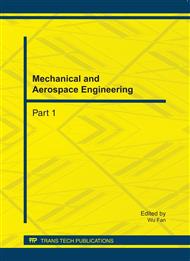p.2206
p.2210
p.2219
p.2228
p.2234
p.2239
p.2245
p.2252
p.2260
Experimental Evaluation of Cooking Oil (Carotene Oil) as Biodiesel Blended on Compression Ignition (CI) Engine
Abstract:
Biodiesel is an alternative fuels for diesel engine with the blending process by chemically combination of vegetable or animal oil and diesel fuels. It is proved that the biodiesel can be used without any modification on the compression ignition (CI) engine. In this study, the cooking oil of namely carotene is used to produce the biodiesel blend fuels in various percentages. The biodiesel blend and diesel fuel are evaluated to analyze the engine performances in 4 cylinder inline CI engine. The characteristics of engine performances namely brake power output and brake specific fuel consumption are measured with various loads applied. The fuel properties of biodiesel blend are investigated namely density, dynamics viscosity and kinetic viscosity. The experimental results show that the performance of biodiesel B10 is better than it counterpart namely diesel in terms of brake power output and brake specific fuel consumption (BSFC).
Info:
Periodical:
Pages:
2234-2238
Citation:
Online since:
October 2011
Authors:
Keywords:
Price:
Сopyright:
© 2012 Trans Tech Publications Ltd. All Rights Reserved
Share:
Citation:


